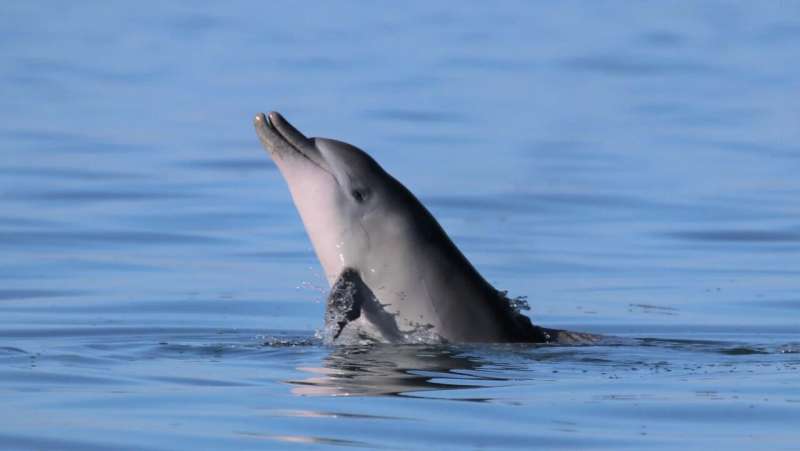This article has been reviewed according to Science X's editorial process and policies. Editors have highlighted the following attributes while ensuring the content's credibility:
fact-checked
trusted source
proofread
Begging dolphins prompt calls to reform recreational fishing

University of Queensland researchers have found bottlenose dolphins in Moreton Bay off Brisbane could be teaching other dolphins to "beg" for food from recreational fishers, with the behavior creating short and long-term risks.
Dr. Léonie Huijser from UQ's School of Veterinary Science made the surprise discovery as she investigated the social structure of Moreton Bay's population of Indo-Pacific bottlenose dolphins for her Ph.D. thesis.
"Within the dolphins' social network, I found a cluster that would consistently patrol moored boats, waiting for recreational fishers to illegally toss them discarded bait or catches," Dr. Huijser said. "Fishing is popular in the bay and it seems some dolphins have learned to exploit it."
Dr. Huijser said the begging behavior was dangerous for the dolphins, and she was concerned it could spread throughout the population.
"Dolphins learn behavior from their peers," she said. "If these 'beggar' dolphins start to associate with 'non-beggar' dolphins, the behavior may spread rapidly, making it a population-wide problem."
Pods of dolphins displaying these behaviors have also been sighted off Bribie Island and North Stradbroke Island.
"Some of the dolphins who boldly approach boats have evidence of propeller strike and fishing line entanglement," Dr. Huijser said.
Professor Michael Noad supervised Dr. Huijser's research project, and said her findings show how adaptable bottlenose dolphins were and how this influenced their social structures.
"Not all adaptations are positive and begging is an example of an adaptive strategy that may have short-term gain but long-term risks," Professor Noad said.
"Dolphins risk becoming reliant on donated fish, which is like junk food to them—quick and easy, but unhealthy. It may lead to food poisoning or nutritional imbalances."
Professor Noad said better policing of illegal dolphin feeding in Moreton Bay was needed. "Dr. Huijser's findings should be used by wildlife rangers to increase awareness through a public education program around the potential negative effects of dolphin feeding," he said.
Dr. Huijser is planning further surveys to inform authorities about "begging hotspots."
More information: Long-Term Social Dynamics of Indo-Pacific Bottlenose Dolphins (Tursiops aduncus) in Moreton Bay, eastern Australia. espace.library.uq.edu.au/view/UQ:b75be3a
Provided by University of Queensland


















